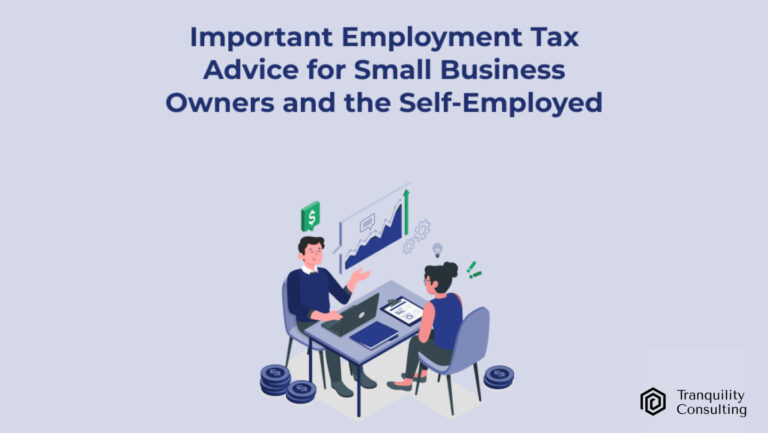Introduction
Employment tax advice is one of the most challenging aspects of managing a small business or being self-employed. Managing these taxes effectively is helpful in avoiding legal risks and unnecessary costs associated with them. In addition to covering important topics in a concise manner, this work pays special attention to the needs of small businesses and freelancers and focuses on the main points of the IRS guidelines in the employment tax area.
Understanding Employment Taxes
Employment taxes are taxes that are paid by employers on behalf of employees and can be withheld by employers as well. These taxes also include income tax, contribution to social security, and Medicare for anyone who considers himself or herself a self-employed person, since the split between these two will be between the employer and the employee. For small business owners and everyone who is self-employed, it is very important to know the taxes that relate to employment. These taxes consist of several components:
- Federal Income Tax: Employers must withhold federal income tax from their employees’ wages. The amount withheld is based on the employee’s W-4 form.
- Social Security and Medicare Taxes (FICA): Both employers and employees contribute to Social Security and Medicare. The current combined tax rate is 15.3%, with both the employer and employee each paying 7.65%.
- Federal Unemployment Tax (FUTA): This tax provides unemployment compensation to workers who have lost their jobs. Unlike other employment taxes, only employers pay FUTA, which is 6% on the first $7,000 of wages paid to each employee annually.
- Additional Medicare Tax: Employees earning over a certain threshold are subject to an additional 0.9% Medicare tax. Employers are responsible for withholding this tax but do not have a matching contribution.
Key Components of Employment Taxes
- Federal Income Tax Withholding: Employers are required to withhold federal income tax from their employees’ wages. The amount withheld is based on the employee’s Form W-4.
- Social Security and Medicare Taxes (FICA): Both employers and employees contribute to these taxes. For self-employed individuals, the equivalent is the Self-Employment Contributions Act (SECA) tax.
- Federal Unemployment Tax (FUTA): This tax provides for payments of unemployment compensation to workers who have lost their jobs. Employers pay this tax; it is not deducted from the employee’s wages.
State-Level Employment Taxes
In addition to federal requirements, small business owners and the self-employed must also adhere to state-level employment taxes. Here are some common state-level employment taxes you should be aware of:
- State Income Tax Withholding: Similar to federal income tax withholding, employers must withhold state income tax from employees’ wages. The specifics of state income tax vary by state, so it’s important to check your state’s requirements.
- Other State-Specific Taxes: Depending on your state, there may be additional employment taxes or contributions required, such as workers’ compensation insurance or training taxes.
Employment Tax Advice for Small Business Owners
- Accurate Record-Keeping: Maintain meticulous records of all wages paid, taxes withheld, and employment tax deposits. This practice is critical for both legal compliance and financial management.
- Understanding Your Obligations: Familiarize yourself with the IRS guidelines regarding employment tax. The IRS website offers comprehensive resources that can help clarify your responsibilities as an employer.
- Timely Tax Deposits: Ensure that you deposit employment taxes on time. The IRS imposes significant penalties for late deposits. Using the Electronic Federal Tax Payment System (EFTPS) can streamline this process.
- Regular Payroll Audits: Conduct regular audits of your payroll system to ensure accuracy in tax withholdings and deposits. This can help prevent errors that might lead to costly penalties.
- Staying Updated: Tax laws and regulations frequently change. Stay informed about the latest updates from the IRS to ensure ongoing compliance.
Employment Tax Advice for the Self-Employed
- Self-Employment Tax: As a self-employed individual, you are responsible for both the employer and employee portions of Social Security and Medicare taxes. This is known as the self-employment tax, calculated on Schedule SE (Form 1040).
- Quarterly Estimated Taxes: Unlike traditional employees, the self-employed must pay estimated taxes quarterly. This includes not only income tax but also self-employment tax. Use Form 1040-ES to calculate and pay these taxes.
- Deductions and Credits: Take advantage of available deductions and credits to reduce your tax liability. For instance, you can deduct half of your self-employment tax when calculating your adjusted gross income.
- Separate Business and Personal Finances: Maintain separate accounts for your business and personal finances. This practice simplifies record-keeping and ensures that you can easily track deductible business expenses.
- Seek Professional Advice: Given the complexity of self-employment taxes, consulting with a tax professional can be invaluable. They can provide tailored advice and help you navigate potential tax pitfalls.
Common Mistakes to Avoid
- Misclassification of Workers: Properly classify your workers as employees or independent contractors. Misclassification can lead to severe penalties. Use IRS guidelines to determine the correct classification.
- Ignoring Payroll Taxes: Failure to withhold and remit payroll taxes can result in substantial penalties and interest. Always prioritize the timely payment of these taxes.
- Inaccurate Tax Filings: Ensure that all tax forms, including W-2s for employees and 1099s for contractors, are accurately completed and filed on time.
- Neglecting State and Local Taxes: Employment tax obligations are not limited to federal taxes. Be aware of state and local tax requirements to ensure full compliance.
Conclusion
Managing employment tax obligations can be challenging for small business owners and the self-employed, but with the right knowledge and resources, it is entirely manageable. By following the employment tax advice outlined here, you can ensure compliance, avoid costly penalties, and focus on growing your business. Always remember to keep thorough records, stay informed about tax law changes, and consider seeking professional advice when necessary. The IRS provides numerous resources that can help you understand and meet your tax responsibilities effectively. Whether you’re a small business owner or self-employed, proactive management of your employment taxes is crucial to your financial success.
FAQs:
- What are employment taxes?
Employment taxes are taxes employers must withhold and pay on behalf of their employees, including federal income tax, Social Security, Medicare, and FUTA. Self-employed individuals pay similar taxes through the Self-Employment Contributions Act (SECA).
- How can small business owners ensure accurate tax withholding?
Small business owners should maintain meticulous records, conduct regular payroll audits, and use reliable payroll software to ensure accurate tax withholding.
- What is the self-employment tax?
The self-employment tax is the combined Social Security and Medicare tax that self-employed individuals must pay. It is calculated on Schedule SE (Form 1040).
- How can Tranquility Consulting help with employment taxes?
Tranquility Consulting offers tailored advice for managing employment taxes, ensuring compliance with IRS guidelines, and providing support for accurate record-keeping and timely tax deposits.
- How can I avoid common employment tax mistakes?
Avoid common mistakes by properly classifying workers, prioritizing payroll tax payments, filing accurate tax forms, and complying with state and local tax requirements.
If you have any questions or need business-related tax consulting advice, please contact us at: [email protected]





